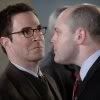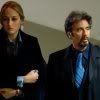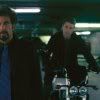
Some sequels should never have been made.
 Picking up the day after the original movie, Harold (John Cho) and Kumar (Kal Penn) are all set for their trip to Amsterdam to surprise Harold's new squeeze, Maria (Paula Garcés), and to partake in legal marijuana. A pot-related incident on the flight causes Harold and Kumar to end in Guantanamo Bay as suspected terrorists.
Picking up the day after the original movie, Harold (John Cho) and Kumar (Kal Penn) are all set for their trip to Amsterdam to surprise Harold's new squeeze, Maria (Paula Garcés), and to partake in legal marijuana. A pot-related incident on the flight causes Harold and Kumar to end in Guantanamo Bay as suspected terrorists. Having escaped from the prison, they embark on a cross-country journey trying to find Colton (Eric Winter), the fiance of Kumar's ex-girlfriend Vanessa (Danneel Harris). Even though Kumar hates Colton (but Harold thinks Colton is a friend), they realize his connection with the government would be an asset to help them get out of trouble. Over the course of the escape, of course Harold and Kumar get into more and more troubles, including a reunion with the habitually high Neil Patrick Harris.
Having escaped from the prison, they embark on a cross-country journey trying to find Colton (Eric Winter), the fiance of Kumar's ex-girlfriend Vanessa (Danneel Harris). Even though Kumar hates Colton (but Harold thinks Colton is a friend), they realize his connection with the government would be an asset to help them get out of trouble. Over the course of the escape, of course Harold and Kumar get into more and more troubles, including a reunion with the habitually high Neil Patrick Harris. John Cho (Star Trek) and Kal Penn (The Namesake) reprise their roles as the stoned odd couple. In The Namesake, Kal Penn proves that he could do serious drama. Unfortunately, he continues to be typecast as an ethnic clown in movies such as Epic Movie and Superman Returns. The ridiculously clueless Kumar made Penn a star, but in this sequel, Penn overplays the character to a point you just want to smack him every time he's on screen. Even a 3-year-old boy acts more mature than he does. Cho fares somewhat better as the uptight, by-the-book Harold. Unfortunately, he is not allowed to play to the character's depth as he did in the original.
John Cho (Star Trek) and Kal Penn (The Namesake) reprise their roles as the stoned odd couple. In The Namesake, Kal Penn proves that he could do serious drama. Unfortunately, he continues to be typecast as an ethnic clown in movies such as Epic Movie and Superman Returns. The ridiculously clueless Kumar made Penn a star, but in this sequel, Penn overplays the character to a point you just want to smack him every time he's on screen. Even a 3-year-old boy acts more mature than he does. Cho fares somewhat better as the uptight, by-the-book Harold. Unfortunately, he is not allowed to play to the character's depth as he did in the original. Rob Corddry (What Happens in Vegas...) plays an incredibly offensive idiot with energy. His character's ignorance and obnoxiousness become repetitive and tiring very quickly. Corddry does the best he can. Roger Bart (American Gangster) has not much to do as the reserved and sympathetic NSA operative; at least he brings some needed humanity to the mayhem around him. Danneel Harris (Extreme Movie) does her job well, despite slim character development, as the object of Kumar's affection. Eric Winter (Brothers & Sisters) joins the rank of ex-jock slimeballs with a wink and super-white teeth. But it's Neil Patrick Harris who steals the show -- once again -- as a fictionalized version of himself. There's just something perverse about watching NPH acting out as a straight, womanizing junkie.
Rob Corddry (What Happens in Vegas...) plays an incredibly offensive idiot with energy. His character's ignorance and obnoxiousness become repetitive and tiring very quickly. Corddry does the best he can. Roger Bart (American Gangster) has not much to do as the reserved and sympathetic NSA operative; at least he brings some needed humanity to the mayhem around him. Danneel Harris (Extreme Movie) does her job well, despite slim character development, as the object of Kumar's affection. Eric Winter (Brothers & Sisters) joins the rank of ex-jock slimeballs with a wink and super-white teeth. But it's Neil Patrick Harris who steals the show -- once again -- as a fictionalized version of himself. There's just something perverse about watching NPH acting out as a straight, womanizing junkie. Writer-directors Jon Hurwitz and Hayden Schlossberg (Harold & Kumar Go To White Castle) try to follow their surprise hit in 2004 with this half-boiled sequel. While the original had similarly graphic sex and humor, it also had a strange innocence about it. After all, Harold and Kumar were high throughout the first movie, so it was actually fun to see two stoned guys doing stupid things. The original movie also was devoid of the sinister aspects that are prevalent in this sequel. There are so many things wrong about this movie -- but I'll try to list them here:
Writer-directors Jon Hurwitz and Hayden Schlossberg (Harold & Kumar Go To White Castle) try to follow their surprise hit in 2004 with this half-boiled sequel. While the original had similarly graphic sex and humor, it also had a strange innocence about it. After all, Harold and Kumar were high throughout the first movie, so it was actually fun to see two stoned guys doing stupid things. The original movie also was devoid of the sinister aspects that are prevalent in this sequel. There are so many things wrong about this movie -- but I'll try to list them here: First, Harold and Kumar are not stoned this time. That makes their stupidity and recklessness painful to watch. These guys are Ivy League students, but they act like circus clowns without the influence of drugs. Kumar, in particular, becomes so irritating and unlikable. It's okay to be stupid, but when he's also selfish, unreasonable, and obnoxious, it's really difficult to identify with him. It's a no-brainer why Harold is mad at him, but what I don't understand is why Harold still tags along? Here's a smart, responsible guy. What's his deal?
First, Harold and Kumar are not stoned this time. That makes their stupidity and recklessness painful to watch. These guys are Ivy League students, but they act like circus clowns without the influence of drugs. Kumar, in particular, becomes so irritating and unlikable. It's okay to be stupid, but when he's also selfish, unreasonable, and obnoxious, it's really difficult to identify with him. It's a no-brainer why Harold is mad at him, but what I don't understand is why Harold still tags along? Here's a smart, responsible guy. What's his deal? I get it -- it's a comedy. But even with comedies, we need some rhyme and reasons for these behaviors. Hurwitz and Schlossberg offer us none. Not to mention they include some of the most offensive characters in movie history: Rob Corddry as the National Security official, in particular, is so off-putting that it's not even funny. It's difficult to make racism funny, and they really fail here. I suppose we're supposed to glean from this movie some social lessons: that racism is bad and one must grow up and face their responsibilities, etc. But all is lost in this big yarn of offensive, sophomoric gags ranging from homophobia and scatology. And the biggest problem is, after the first movie and this, Harold and Kumar still won't grow up.
I get it -- it's a comedy. But even with comedies, we need some rhyme and reasons for these behaviors. Hurwitz and Schlossberg offer us none. Not to mention they include some of the most offensive characters in movie history: Rob Corddry as the National Security official, in particular, is so off-putting that it's not even funny. It's difficult to make racism funny, and they really fail here. I suppose we're supposed to glean from this movie some social lessons: that racism is bad and one must grow up and face their responsibilities, etc. But all is lost in this big yarn of offensive, sophomoric gags ranging from homophobia and scatology. And the biggest problem is, after the first movie and this, Harold and Kumar still won't grow up. So here's my final recommendation: escape from this stinker!
So here's my final recommendation: escape from this stinker!Stars: John Cho, Kal Penn, Rob Corddry, Jack Conley, Roger Bart, Neil Patrick Harris, Danneel Harris, Eric Winter, Paula Garcés
Directors: Jon Hurwitz, Hayden Schlossberg
Writers: Jon Hurwitz, Hayden Schlossberg
Distributor: Warner Bros
MPAA Rating: R for strong crude and sexual content, graphic nudity, pervasive language and drug use
Running Time: 100 Minutes
Ratings:
Script – 4
Performance – 5
Direction – 5
Cinematography – 6
Music/Sound– 6
Editing – 7
Production – 6
Total – 5.1 out of 10

 Dr. Jack Gramm (Al Pacino) is a celebrated forensic psychiatrist in Seattle working with the FBI. His most famous case was the murder of Joanie Cates (Vicky Huang). Her perp, Jon Forster (Neal McDonough), is now on death row thanks to Gramm's convincing testimony. On the eve of Forster's execution, Gramm receives an obscure phone call telling him that he has 88 minutes to live.
Dr. Jack Gramm (Al Pacino) is a celebrated forensic psychiatrist in Seattle working with the FBI. His most famous case was the murder of Joanie Cates (Vicky Huang). Her perp, Jon Forster (Neal McDonough), is now on death row thanks to Gramm's convincing testimony. On the eve of Forster's execution, Gramm receives an obscure phone call telling him that he has 88 minutes to live.  At first Gramm disregards the threat.Then as the threats become more imminent -- and a student got murdered the night before -- he begins to suspect his students and people around him. Clearly Forster couldn't have committed the murder, and he rules out a copycat since the Cates murder was 9 years ago, and the new murder is down to the finest details. So could he have been wrong? Is Forster innocent? As his time is running out, Gramm must piece all the information together to find the real killer.
At first Gramm disregards the threat.Then as the threats become more imminent -- and a student got murdered the night before -- he begins to suspect his students and people around him. Clearly Forster couldn't have committed the murder, and he rules out a copycat since the Cates murder was 9 years ago, and the new murder is down to the finest details. So could he have been wrong? Is Forster innocent? As his time is running out, Gramm must piece all the information together to find the real killer. Al Pacino (
Al Pacino ( Alicia Witt (
Alicia Witt ( The remaining cast includes Amy Brenneman (
The remaining cast includes Amy Brenneman ( Gary Scott Thompson's (
Gary Scott Thompson's ( Also, Mr. Thompson, everyone who's familiar with mysteries know that the least expected person is usually the guilty one. Give us something more interesting, please. But predictability is not even the fatal flaw of Thompson's screenplay. The cardinal sin is that he completely misses the boat with his protagonist. Gramm is unlikable, unsympathetic (even with the history about his kid sister) and, worst of all, unintelligent. Seriously, this guy is a forensic psychiatrist, and we expect him to use his knowledge and wit to find and outsmart the killer. Not at all. Gramm is passive almost up to the end. He acts more like a confused idiot than an expert psychiatrist. When you fail to make the audience identify and care about the hero, all is lost.
Also, Mr. Thompson, everyone who's familiar with mysteries know that the least expected person is usually the guilty one. Give us something more interesting, please. But predictability is not even the fatal flaw of Thompson's screenplay. The cardinal sin is that he completely misses the boat with his protagonist. Gramm is unlikable, unsympathetic (even with the history about his kid sister) and, worst of all, unintelligent. Seriously, this guy is a forensic psychiatrist, and we expect him to use his knowledge and wit to find and outsmart the killer. Not at all. Gramm is passive almost up to the end. He acts more like a confused idiot than an expert psychiatrist. When you fail to make the audience identify and care about the hero, all is lost. The saving grace of this incredulous potboiler is Jon Avnet's (
The saving grace of this incredulous potboiler is Jon Avnet's (
 Lawrence Wetherhold (Dennis Quaid) is a Carnegie-Mellon University English Literature professor. He's unkempt, gruff, grumpy, self-absorbed, and generally disinterested in everything around him except his love for Victorian novels, and his own manuscript no publisher wants to touch. He's also widowed with two children: James (Ashton Holmes), a Carnegie-Mellon undergrad who is trying to impress his father, and Vanessa (Ellen Page), a sharp-tongued young Republican who just got accepted to Stanford.
Lawrence Wetherhold (Dennis Quaid) is a Carnegie-Mellon University English Literature professor. He's unkempt, gruff, grumpy, self-absorbed, and generally disinterested in everything around him except his love for Victorian novels, and his own manuscript no publisher wants to touch. He's also widowed with two children: James (Ashton Holmes), a Carnegie-Mellon undergrad who is trying to impress his father, and Vanessa (Ellen Page), a sharp-tongued young Republican who just got accepted to Stanford. A series of circumstances result in Lawrence having a stress-induced seizure. His attending doctor, Janet Hartigan (Sarah Jessica Parker) happens to be a former student who harbored a crush on him. Of course, Lawrence doesn't remember her. Forbidden by law to drive for six months, Lawrence grudgingly accepts it when his drifter of an adoptive brother, Chuck (Thomas Haden Church), volunteers to drive him around, for a stipend and free room and board.
A series of circumstances result in Lawrence having a stress-induced seizure. His attending doctor, Janet Hartigan (Sarah Jessica Parker) happens to be a former student who harbored a crush on him. Of course, Lawrence doesn't remember her. Forbidden by law to drive for six months, Lawrence grudgingly accepts it when his drifter of an adoptive brother, Chuck (Thomas Haden Church), volunteers to drive him around, for a stipend and free room and board. Nonetheless, Lawrence takes on an interest in Janet, even to his daughter's objection. Meanwhile, Vanessa develops an unhealthy affection for her uncle. Lawrence is up for a promotion at Carnegie-Mellon and a big publisher suddenly shows an interest in his intellectually stiff novel. Everything seems to be coming along until Lawrence is forced to realize that he and everyone surrounding him are falling apart.
Nonetheless, Lawrence takes on an interest in Janet, even to his daughter's objection. Meanwhile, Vanessa develops an unhealthy affection for her uncle. Lawrence is up for a promotion at Carnegie-Mellon and a big publisher suddenly shows an interest in his intellectually stiff novel. Everything seems to be coming along until Lawrence is forced to realize that he and everyone surrounding him are falling apart. Dennis Quaid (
Dennis Quaid ( Sarah Jessica Parker (
Sarah Jessica Parker ( Ellen Page (
Ellen Page ( First-time screenwriter Mark Poirier has given us a keenly observed, introspective story driven by a strong central character and witty dialogue. By far, the strength of the screenplay is in the relationships as well as Lawrence's characterization. Within minutes of the film we're given many clues of Lawrence's personalities, behavioral issues, and psychology. Unfortunately, after some contrived, rote plot development to set up the story, it begins to meander. Furthermore, we don't really get to know the characters except Lawrence. We're left to wonder about the motivations behind Janet's hot and cold attitude toward Lawrence (or Lawrence's insistence in courting her), James' indifference, or Vanessa's belligerence. Chuck's role seems to be the obligatory comic relief -- at least he does serves, at times, as Lawrence's moral mirror.
First-time screenwriter Mark Poirier has given us a keenly observed, introspective story driven by a strong central character and witty dialogue. By far, the strength of the screenplay is in the relationships as well as Lawrence's characterization. Within minutes of the film we're given many clues of Lawrence's personalities, behavioral issues, and psychology. Unfortunately, after some contrived, rote plot development to set up the story, it begins to meander. Furthermore, we don't really get to know the characters except Lawrence. We're left to wonder about the motivations behind Janet's hot and cold attitude toward Lawrence (or Lawrence's insistence in courting her), James' indifference, or Vanessa's belligerence. Chuck's role seems to be the obligatory comic relief -- at least he does serves, at times, as Lawrence's moral mirror. Directed by commercial director Noam Murro, the film has a no-frill, earthy quality to it. The pacing also feels languid, giving the characters time and opportunity to develop. Unfortunately, the intimate nature of the story as well as the lack of a substantial plot hinders the film. While interesting, the characters are not all that relatable and likable, and that, too, becomes a burden for the dramedy.
Directed by commercial director Noam Murro, the film has a no-frill, earthy quality to it. The pacing also feels languid, giving the characters time and opportunity to develop. Unfortunately, the intimate nature of the story as well as the lack of a substantial plot hinders the film. While interesting, the characters are not all that relatable and likable, and that, too, becomes a burden for the dramedy.
 The year is 1925. Dodge Connelly (George Clooney) is a 45-year-old pro football player trying to make ends meet and keeping his teammates employed. Back then, being a "pro" means someone's being paid to play a game that is no more glamorous than a cockfight or a circus act. When the Duluth Bulldog disbands because its last sponsor pulls out, Dodge is laid off. Without any other skills, he can't find a job and he's down to hist last pennies. That's when he gets an idea.
The year is 1925. Dodge Connelly (George Clooney) is a 45-year-old pro football player trying to make ends meet and keeping his teammates employed. Back then, being a "pro" means someone's being paid to play a game that is no more glamorous than a cockfight or a circus act. When the Duluth Bulldog disbands because its last sponsor pulls out, Dodge is laid off. Without any other skills, he can't find a job and he's down to hist last pennies. That's when he gets an idea. The idea is to legitimize pro football and make it an national spectator sport much like baseball, and Dodge knows college football star Carter Rutherford (John Krasinski) is just the right man to make that happen. A WWI hero, Carter constantly draws thousands of fans to his games. Dodge promises Carter and his manager, CC Frazier (Jonathan Pryce), $5000 a game if Carter plays for Duluth. And he's right. Carter's celebrity helps propel pro football into the national spotlight.
The idea is to legitimize pro football and make it an national spectator sport much like baseball, and Dodge knows college football star Carter Rutherford (John Krasinski) is just the right man to make that happen. A WWI hero, Carter constantly draws thousands of fans to his games. Dodge promises Carter and his manager, CC Frazier (Jonathan Pryce), $5000 a game if Carter plays for Duluth. And he's right. Carter's celebrity helps propel pro football into the national spotlight. Meanwhile, reporter Lexie (Renée Zellweger) is doing a story on Carter, but she has an ulterior motive. She knows there's more to the story of Carter's heroic act. Her ambition comes into conflict with Dodge's plans, while Carter is becoming very fond of her despite their age difference. Dodge is not willing to expose Lexie because he, too, is enamored of Lexie.
Meanwhile, reporter Lexie (Renée Zellweger) is doing a story on Carter, but she has an ulterior motive. She knows there's more to the story of Carter's heroic act. Her ambition comes into conflict with Dodge's plans, while Carter is becoming very fond of her despite their age difference. Dodge is not willing to expose Lexie because he, too, is enamored of Lexie. George Clooney (
George Clooney ( The weakest link in the trio of leads is Renée Zellweger (
The weakest link in the trio of leads is Renée Zellweger ( The supporting cast is generally good, including dependable Jonathan Pryce (
The supporting cast is generally good, including dependable Jonathan Pryce ( The screenplay by first-time screenwriters Duncan Brantley and Rick Reilly follows the typical screwball comedy formula, reminiscent of classics such as
The screenplay by first-time screenwriters Duncan Brantley and Rick Reilly follows the typical screwball comedy formula, reminiscent of classics such as  The banter between the characters, especially between Lexie and Dodge, sounds forced and unnatural: Zellweger seems to just dole out the barbed insults out of necessity (or as instructed by the script). The plot never rises above the banality of the situations -- often, it feels irrelevant. The plot falters toward the end, culminating in a climax that feels flat. Even though we spend a lot of time with the characters, we don't really know much about them (Carter's character is the least developed). And at the end, we really don't care about what happens to them.
The banter between the characters, especially between Lexie and Dodge, sounds forced and unnatural: Zellweger seems to just dole out the barbed insults out of necessity (or as instructed by the script). The plot never rises above the banality of the situations -- often, it feels irrelevant. The plot falters toward the end, culminating in a climax that feels flat. Even though we spend a lot of time with the characters, we don't really know much about them (Carter's character is the least developed). And at the end, we really don't care about what happens to them.